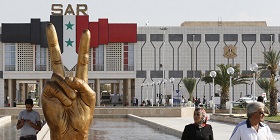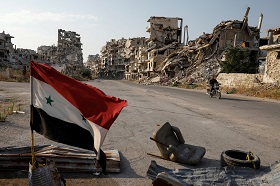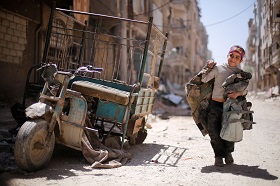The situation around Russia in Syria is up for debate. No doubt, Russia would like to lead a reconstruction effort in Syria, in harmony with all relevant partners, including the UN, the EU, the USA, China, India, Turkey, Iran, Israel, the Sunni Arab states including the Golf Council Countries (GCC-states), Egypt and Morocco. However, many of the parties on the list of wished-for partners are strongly hostile to each other, and it might therefore perhaps not be possible for Russia to make all these ends come together, or to cut through the proverbial “Gordian Knot”. If Russia cannot create a reconstruction for all of Syria, which is what Russia wants most of all, then Russia will have to think about a “second option” for Russia’s future presence in Syria.
What might be a “second option” for Russia in Syria?
It would not make sense at any rate for Russia to leave Syria completely. After all, Russia has spent a lot of blood and treasure to achieve the stabilization now achieved, it does not want a resurgence of Sunni extremism by groups like ISIS and similar, and it has strategic interests in Syria, including an air base and a naval base.
However, as a “second option”, if the preferred cooperation for reconstruction of all of Syria should not be achievable, would be for Russia to concentrate and reduce her presence to a part of Syria. Russia can entrench itself in north-west Syria, creating its own zone of exclusive Russian military control and administration together with Syrian forces which are sympathetic to Russia as well as to Syria’s current government. Such a “Russian” zone could consist of a square of Syria consisting of Latakia, Tartus, Homs, and Ma’arat-Al-Numan.
The area mentioned above is already mainly controlled by Russia (incl. Russia-friendly units). Good. The area contains the air and naval bases pivotal for Russian military power. Good. The area will enable Russia to keep naval and air supplies possible from outside. Good. The area is strategically located to enable Russia to reenter all other parts of Syria, north, east and south. Good. The region mentioned contains a great deal of Syria’s population, including many of the Alawites, of which a large part support the existing Syrian government under President Bashar Al-Assad. Russia can thus expect to achieve social stability, without having to allocate a lot of military resources to constantly handle large-scale hostile actions inside this zone. The area holds a great part of Syria’s economic and reconstruction-potential. Good. The ports are open for imports of food, medicine, and raw materials—and being the only ports of Syria, they even control import-export of goods to the rest of Syria. Excellent. The ports will facilitate a reconstructed economy in this area. Great.
Russia might create success here, and control this part of Syria more or less indefinitely. In time, because the area is limited, and the preconditions are favorable, Russia could lead a rather successful reconstruction of this part of north-western Syria. Even tourism on the coast might be redeveloped over time, because there is an airport for travel, and stability can be maintained.
Russia can even prepare the possibility for a “second seat” for the official government for Syria, to be used, in case continuation of official governing from Damascus should become physically impossible. In other words: Russia can if need be, offer Syria’s government a place to move to and continue the statehood of the UN-recognized sovereign government, if Damascus should fall into the hands of others. For this purpose, Russia could supply a small élite unit for the official protection (and if need may be, evacuation) of Syria’s government in Damascus, but otherwise, Russia would stay out of Damascus.
In neighboring Idlib, Russia will in time (now or later, as may be) act in a yet unspecified, but flexible and highly decisive manner as need be - in accordance with the developing situation . If opportune for Russian interests, with friendly forces after a clearing of the area Russia might establish control over some of Idlib, but not necessarily. Russia would stay then out of all the Syrian border-zone to Turkey and also stay out of Kurdish areas. In northern and eastern Syria Arabs, Kurds, and Turkey might then “negotiate” their own balance (maybe fighting bitterly).
If ISIS should rise anywhere in Syria again, Russia would offer the supply of air power to any party fighting ISIS—be as it may, Kurds, west-supported rebels, Iran, whomever - but nothing more than air power.
Bottom line would be, that the whole area south of Homs (including Damascus) all the way down to Golan, with such a Russian strategy, would be “free-for-all”. Between Golan and up to the south of Homs, Iran and Israel might then fight each other if they want to—as much as they please—and for as long as they please—without Russia interfering.
What might the consequences of such a Russian strategy be for different parties?
Russia probably can live with all this—not happily, but well enough, at least as long as ISIS does not reemerge.
Syria may be reconstructed in the north-west in the area under Russian influence, the Kurds will probably survive in a clamped position—but the rest of Syria, including the large population areas south of Damascus, may continue in some kind of chaos.
Turkey might also live with all this. The US might be okay or not too happy, but will not reenter Syria in forceful numbers when they are mostly gone—that is relatively certain (though nothing is of course ever certain in politics). The EU would definitely be very unhappy with such a situation because, with continuing hostilities in Syria, millions of Syrian refugees in Europe could not be sent back to Syria. But the EU would not be asked—the EU would just have to send more élite soldiers, if ISIS should reemerge. Lebanon would also not be asked.
Iran might be somewhat divided. Circles around the President and Foreign Minister of Iran might not be too pleased with such a situation. But it is imaginable, other important circles in Iran may even welcome and know to militarily fully exploit such an arrangement.
But Israel?
Potentially, such a situation can become absolutely devastating to Israel.
Iran and Hamas can use the area from Damascus and south to Golan for sending missiles into Israel from a big number of mobile and hard-to-hit positions. Iran can continue doing this again-and-again for years—indefinitely. Israel can hardly stop that, unless it controls and holds all of Syria all the way up to and including the great city of Damascus. However, if Israel invades to “clear-up” or even hold the area, Iran and Hamas have a fantastic strategic option simply to withdraw their forces further north, stretching the Israeli forces thin. This is what Hamas did several times in Lebanon.
So what would Hamas and Iran than have to do, to win?
The first thing needed for Hamas and Iran to win against Israel in southern Syria would be to not “hold ground”. When their enemy, the Israelis, advances, they fall back; when their enemy retreats, they advance. Their geography works to their advantage in that they will have plenty of strategic depth to fall back on.
The second thing needed for them to win is to protract the war indefinitely. “Losing” every battle, but winning the war. Both Mao and later Vietnamese general Võ Nguyên Giáp (two of the greatest military strategists and battle-leaders in history) very clearly stated this, and they both proved that it leads to victory.
The Israeli Defense Forces (IDF) would then have to fall back to positions closer down to Golan sooner or later—and Iranian forces and Hamas will then simply follow after the IDF down southwards, continuing to harass and attack the IDF and send more missiles into Israel. Hamas knows how to fight the IDF. Hamas are the only fighters who have ever defeated the IDF, and they have done so rather thoroughly with fewer means then they have now, backed by Iran. Very probably, Hamas and Iran will be able long-term to manage the situation and over years bleed-out the IDF here.
Hamas and Iranian soldiers with similar skills like Hamas. No air force needed for Hamas and the Iranian units, they’ll take the pounding from above, but will not be defeated on the ground. They need short and mid-range missiles to fight Israel, and they have plenty of those. Would that be possible? Yes. Though nothing is sure in war, it could very likely be possible.
Hamas has no air force but was successful in Lebanon. Hamas once even stalled an Israeli attack with top-modern Merkava tanks already at a short distance into Lebanon. Taliban also has no air force, but still is again (after fighting the Soviets, and now the US for another 16 years) successful. North Vietnam had little air defense against the USA—and Viet Cong had none. The Vietnamese won not only against the US but also without air force against France before that. The Algerians kicked France out—they also had no air force. So yes, even without air power, such a strategy, as I describe here, could actually be winning for Hamas and Iran against Israel in southern Syria.
What could Israel do to counter this?
Israel could then try 2–3 things, which they tried in southern Lebanon, but which eventually never gave Israel any peace or victory which they can live on.
Firstly, Israel could try to recruit, organize and supply friendly Syrians (a “free” Syrian force) to make them put up a buffer zone, a statelet or “free Syrian territory” by whatever name, they can come up with. From this area, the Israelis could use “free Syrians” as their own proxy-forces against Hamas and Iran. This strategy (even after criminal atrocities in Shabra and Shatila) eventually didn’t work for Israel in southern Lebanon—and it won’t work for Israel in a southern Syria either.
Secondly, Israel could, for instance, try to bomb Damascus flat, in order to put pressure on the opposing forces. This, Israel did in Beirut, bombing large residential areas flat. It worked to some limited degree in Lebanon because Lebanon has a number of different factions who were impacted. But a similar strategy won’t work by bombing Damascus, because neither Hamas nor Iranian forces have families resident there—on the contrary, an Israeli large-scale bombing of residential areas in Damascus will only increase great hostility against Israel, creating even more enemies fighting against them.
Thirdly, Israel could assist Sunni circles to recreate ISIS-like fighting groups inside Syria, to weaken the Shia Iranians inside their strategic hinterland inside Syria. However, facilitating a reemerging ISIS in Syria would create a terrorism problem in the EU, Turkey, Russia in other places—and if discovered, would severely degrade international diplomatic support for Israel.
Looking at all the options, it remains hard to see, how Israel can ever win or even manage such a scenario. Not only will the military situation be difficult for Israel—the diplomatic situation would become very difficult for Israel too, especially in relations to the EU. Because the EU wants peace and stability, and wants to return millions of Syrians back to Syria—and the ongoing war in southern Syria would make that impossible.







